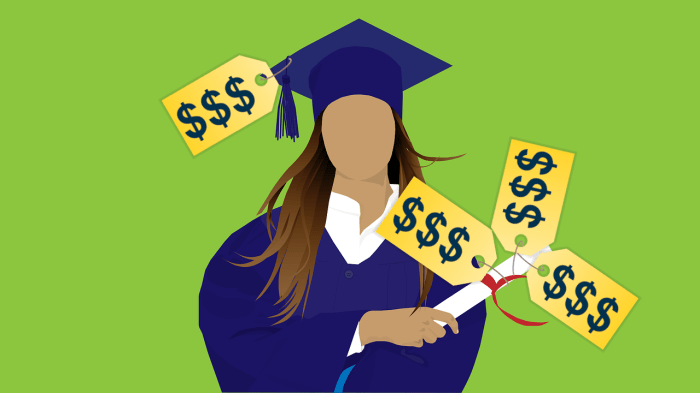
The pursuit of higher education often hinges on securing student loans. However, a less-than-perfect credit history or the lack of a cosigner can create significant hurdles. This guide delves into the complexities of obtaining student loans without a cosigner, even with bad credit, exploring available options, strategies for improvement, and alternative funding sources. We’ll equip you with the knowledge to navigate this challenging landscape and achieve your educational goals.
Understanding your credit score’s impact is paramount. We’ll examine how various credit ranges affect loan eligibility and interest rates, providing practical advice on improving your creditworthiness. Furthermore, we’ll explore federal and private loan programs that don’t necessitate a cosigner, comparing their benefits and drawbacks. Finally, we’ll consider alternative funding avenues and responsible debt management strategies to ensure a financially sound path toward your education.
Understanding Credit Scores and Student Loans

Securing student loans without a cosigner, especially with a less-than-perfect credit history, can present challenges. Understanding how credit scores impact your loan eligibility is crucial for navigating this process successfully. This section will explore the relationship between credit scores and student loan applications, outlining the factors that influence your score and the implications for loan terms.
Credit Scores and Loan Eligibility
A bad credit score significantly impacts your eligibility for student loans. Lenders view a low credit score as an increased risk, as it suggests a higher probability of loan default. This increased risk often translates to higher interest rates, less favorable repayment terms, or even outright loan rejection. The better your credit score, the more favorable the loan terms are likely to be.
Credit Score Ranges and Loan Approval
Credit scores typically range from 300 to 850, with higher scores indicating better creditworthiness. Different lenders may have slightly varying criteria, but generally:
* Scores below 670 (Subprime): Securing a loan without a cosigner will be extremely difficult. Lenders may offer loans with significantly higher interest rates or require a larger down payment to mitigate risk. Loan approval is not guaranteed.
* Scores between 670 and 739 (Fair to Good): Loan approval is more likely, but interest rates may still be higher than those offered to individuals with excellent credit. You may need to shop around for the best rates.
* Scores above 740 (Good to Excellent): These individuals are generally considered low-risk borrowers. They’re more likely to qualify for lower interest rates and more favorable loan terms.
Factors Affecting Credit Scores
Several factors contribute to your credit score. Negative factors include:
* Late or missed payments: Consistent late payments severely damage your credit score. Even one missed payment can have a noticeable impact.
* High credit utilization: Using a significant portion of your available credit (e.g., consistently using more than 30% of your credit limit) can negatively affect your score.
* Bankruptcies and foreclosures: These events have a significant and long-lasting negative impact on your credit score.
* Collections accounts: Outstanding debts sent to collections agencies severely damage your credit score.
* Numerous credit inquiries: Applying for many loans or credit cards in a short period can lower your score.
Loan Options Based on Credit Score
The following table illustrates how credit scores influence loan availability, interest rates, and repayment terms. These are illustrative examples and actual offers may vary depending on the lender and other factors.
| Credit Score Range | Loan Availability | Interest Rates (Example) | Repayment Terms (Example) |
|---|---|---|---|
| Below 670 | Very Limited; Cosigner Often Required | 10-18% or higher | Short-term options may be more readily available |
| 670-739 | More readily available, but at a higher cost | 8-14% | Standard repayment plans, potentially with higher monthly payments |
| 740 and Above | Widely available, with favorable terms | 5-9% | Variety of repayment plans, including longer-term options |
Managing Student Loan Debt

Successfully navigating student loan debt requires proactive planning and consistent effort. Understanding your loan terms, creating a realistic budget, and employing effective repayment strategies are crucial for minimizing financial stress and achieving long-term financial well-being. This section Artikels practical methods for responsible debt management.
Effective Strategies for Responsible Debt Management
Effective debt management involves a multi-pronged approach encompassing budgeting, financial planning, and understanding loan terms. Prioritizing loan payments, exploring repayment options, and seeking professional advice when needed are all integral components of a successful strategy. Failing to address student loan debt proactively can lead to accumulating interest, impacting credit scores, and hindering future financial goals.
Budgeting Techniques and Financial Planning Tools
Creating a detailed budget is fundamental to managing student loan debt. This involves tracking income and expenses to identify areas where savings can be maximized. Several budgeting methods exist, each with its own advantages. For example, the 50/30/20 rule allocates 50% of after-tax income to needs, 30% to wants, and 20% to savings and debt repayment. Alternatively, zero-based budgeting assigns every dollar a purpose, ensuring all income is accounted for. Financial planning tools, such as budgeting apps (Mint, YNAB), spreadsheet software (Excel, Google Sheets), and online calculators, can greatly assist in this process. These tools automate calculations, track progress, and provide visual representations of financial health.
Understanding Loan Terms and Repayment Schedules
Thoroughly understanding your loan terms, including interest rates, repayment periods, and any associated fees, is critical. Different loan types (federal vs. private) have varying repayment options and terms. Federal loans often offer income-driven repayment plans that adjust monthly payments based on income and family size. Private loans typically have fixed repayment schedules. Carefully reviewing your loan documents and understanding the implications of various repayment plans is essential for making informed decisions. A delay in payments can lead to penalties and negatively impact credit scores.
Sample Budget Demonstrating Responsible Debt Management
The following sample budget illustrates responsible debt management, allocating sufficient funds for loan repayment while covering essential living expenses. This is a hypothetical example and should be adjusted based on individual circumstances.
- Monthly Income: $3,000
- Housing: $1,000 (Rent/Mortgage)
- Transportation: $300 (Car Payment, Gas, Public Transportation)
- Food: $500 (Groceries, Eating Out)
- Utilities: $200 (Electricity, Water, Internet)
- Student Loan Payment: $500
- Savings: $200 (Emergency Fund, Future Goals)
- Other Expenses: $300 (Entertainment, Clothing, Personal Care)
Note: This budget demonstrates a balance between essential expenses and debt repayment, with dedicated funds allocated for savings. Adjustments should be made based on individual financial situations. Overspending in any category may require reevaluation of expenses or exploration of additional income sources.
Potential Risks and Considerations
Securing a student loan without a cosigner and with bad credit can present significant financial challenges. Understanding the potential risks involved is crucial for making informed decisions and mitigating potential negative consequences. High-interest rates, the possibility of loan default, and the overall impact on your financial future are all important factors to consider.
High-interest rates significantly increase the total cost of your education. A seemingly manageable loan amount can balloon into a substantial debt burden over time due to compounding interest. For example, a $20,000 loan with a 10% interest rate will cost significantly more than the same loan with a 5% interest rate, even with the same repayment plan. This increased cost can limit future financial opportunities, such as buying a home or investing.
Consequences of Loan Default
Defaulting on your student loans has severe repercussions. It can lead to wage garnishment, where a portion of your paycheck is automatically deducted to repay the debt. Your credit score will be severely damaged, making it difficult to obtain credit for mortgages, car loans, or even credit cards in the future. Furthermore, default can impact your ability to rent an apartment or secure certain jobs, as potential landlords and employers may conduct credit checks. The government may also take legal action to recover the debt, potentially leading to further financial penalties. In short, loan default can have a lasting and detrimental impact on your financial well-being.
Resources for Students Facing Financial Hardship
Numerous resources are available to assist students struggling with loan repayment. The National Foundation for Credit Counseling (NFCC) offers free or low-cost credit counseling services, helping individuals develop personalized debt management plans. They can help you negotiate with your lenders for more manageable repayment options, such as income-driven repayment plans. Additionally, many colleges and universities have financial aid offices that can provide guidance and support to students facing financial challenges. These offices may offer information on grant programs, scholarships, and other forms of financial assistance. Finally, the federal government offers several repayment programs designed to make student loan repayment more manageable for those experiencing financial hardship.
Importance of Seeking Professional Financial Advice
Navigating the complexities of student loans, especially with bad credit and without a cosigner, can be overwhelming. Seeking professional financial advice from a certified financial planner (CFP) or a similar qualified professional is highly recommended. A financial advisor can provide personalized guidance on managing your debt, exploring various repayment options, and developing a long-term financial plan to help you achieve your financial goals while minimizing the risks associated with high-interest student loans. They can also help you understand the implications of different repayment plans and strategies to ensure you make the best decisions for your individual circumstances.
Final Thoughts

Successfully navigating the process of obtaining student loans without a cosigner and despite a less-than-ideal credit score requires proactive planning and a thorough understanding of available resources. By leveraging the information presented – from improving creditworthiness to exploring alternative funding – you can significantly increase your chances of securing the financial support needed for your education. Remember, responsible financial planning and proactive debt management are crucial for long-term success.
FAQ Summary
What is considered a “bad” credit score for student loans?
Generally, a credit score below 670 is considered subprime and may significantly limit loan options or result in higher interest rates.
Can I get a federal student loan without a cosigner and bad credit?
While federal loans generally don’t require cosigners, your credit score will still influence your eligibility and loan terms. A low score might limit your loan amount.
What are the consequences of defaulting on a student loan?
Defaulting can lead to wage garnishment, tax refund offset, damage to your credit score, and difficulty obtaining future loans or credit.
How long does it take to significantly improve my credit score?
Improving your credit score takes time and consistent effort. You might see noticeable improvements within 6-12 months with diligent credit management.
